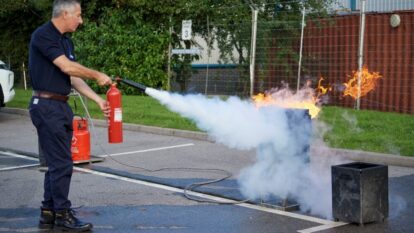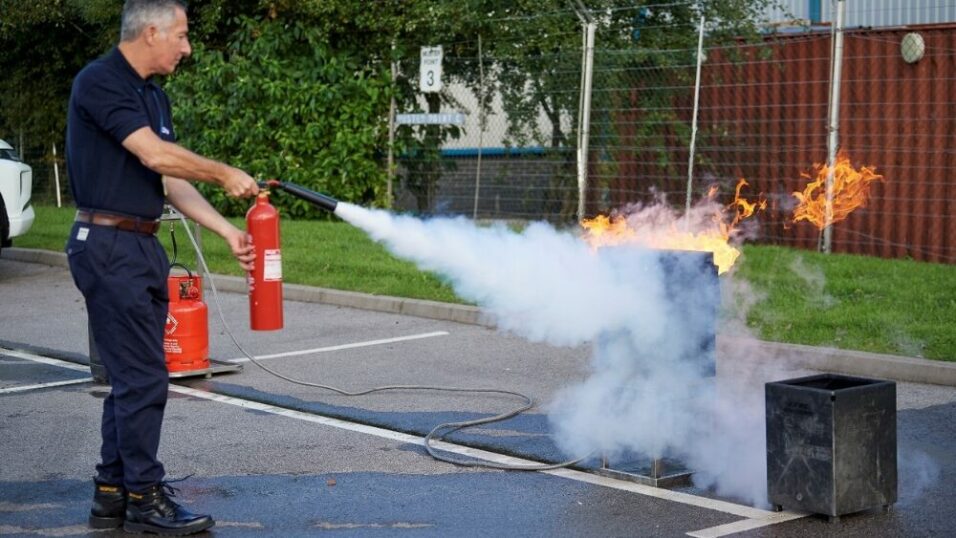



Fire Extinguisher Mythbusting: What You Really Need to Know About Foam Extinguishers and C8 (PFOA)
By Chubb | 25th June 2025
Changes to fire safety regulations often lead to confusion and misinformation, especially when complex technical terms are involved. Recently, some uncertainty has emerged around the future of foam fire extinguishers and whether businesses need to remove or replace them by July 2025.
In this blog, Lee Wilkes, Supply Chain Quality & PFX Product Manager at Chubb Fire & Security and a leading voice on fire extinguisher compliance, explores what the regulations actually say, which foam extinguishers are affected and how businesses can make informed decisions about replacements. From fire extinguisher myths to the phase-out of C8 (PFOA), we’ll break down the facts and clarify what action, if any, is required.
The Myth: “All Foam Fire Extinguishers Must Be Removed by 2025”
The most common misunderstanding is that all foam fire extinguishers are now non-compliant and must be phased out by 4 July 2025.
The reality is more nuanced. The phase-out date applies specifically to certain older foam extinguishers that contain long-chain fluorinated chemicals known as C8 (PFOA), substances that have raised environmental and health concerns.
The UK legislation follows the EU’s restriction of C8 (perfluorooctanoic acid) under the Persistent Organic Pollutants (POPs) Regulation (EU) 2019/1021. Under this framework, foam extinguishers using this compound will no longer be permitted after the deadline due to its persistence in the environment and potential toxicity.
What Is C8 (PFOA) and Why Is It Being Phased Out?
C8 (PFOA) belongs to a group of chemicals known as PFAS (per- and polyfluoroalkyl substances), often referred to as “forever chemicals” because they do not break down easily in nature. Historically used in firefighting foams for their effectiveness on flammable liquid fires, C8 compounds have become the focus of environmental and health regulations worldwide.
The phase-out is designed to reduce the risk of long-term contamination by removing products containing C8 from commercial use.
The Reality: Newer Foam Extinguishers Are Not Affected
Many businesses may already be using foam extinguishers that do not contain C8. In recent years, manufacturers – including Chubb – have transitioned to alternative formulations using shorter-chain compounds, such as C6 (PFHxA), which currently remain permitted under UK regulations.
If your site uses these newer C6-based foam extinguishers, there is no legal requirement to replace them before July 2025. However, regulatory developments may continue as scientific understanding evolves.
How Can You Check Your Current Fire Extinguishers?
If you’re unsure whether your foam extinguishers contain C8, there are practical steps you can take:
- Review the label or product specification to identify the foam type
- Check the manufacturing date, as older extinguishers are more likely to contain C8
- Consult with a professional fire safety provider, like Chubb, who can inspect your equipment and offer clear advice.
Should You Replace Your Foam Extinguishers Now?
If your extinguishers contain C8, replacement will be required before 4 July 2025 to remain compliant. Some businesses may choose to replace affected extinguishers sooner to avoid last-minute challenges or supply chain delays.
For businesses using C6 foam or other extinguishing agents, no immediate action is required but staying informed and regularly reviewing your equipment is strongly advised.
Trusted Support from Chubb
As a leading UK fire safety provider, Chubb closely monitors evolving legislation to ensure customers remain fully compliant and protected. Our expert engineers can assess your fire extinguisher inventory, identify any affected units and recommend suitable replacements.
Fire extinguisher compliance doesn’t have to be confusing, but it does require accurate, up-to-date information. If you’re unsure where your business stands, Chubb is ready to help. Talk to our team today.
© 2025 Chubb Fire and Security. All rights reserved.
The information provided in this blog is for general informational purposes only and does not constitute professional advice. Chubb Fire and Security is not responsible for any actions taken based on the information provided. This blog is not an advertisement or advice document. You are responsible for complying with any legal or regulatory requirements that apply to you.
Chubb Fire and Security reserves the right to modify the content and offers mentioned in this blog without prior notice.
 Global network
Global network
